
FEDERAL RESERVE BANK OF ST LOUIS REVIEW
Scope & Guideline
Empowering researchers with cutting-edge economic analyses.
Introduction
Aims and Scopes
- Monetary Policy Analysis:
The journal regularly publishes research examining the implications of monetary policy decisions, including interest rates, inflation, and the overall economic landscape. This includes historical analyses and contemporary assessments of policy effectiveness. - Fiscal Policy and Economic Impact:
Research in this area explores the effects of fiscal policy on macroeconomic variables, such as employment, inflation, and economic growth. The journal emphasizes empirical studies that assess the efficacy of government spending and taxation. - Labor Market Dynamics:
The journal covers various aspects of labor economics, including employment trends, wage disparities, and the implications of macroeconomic shocks on labor markets, particularly during crises like the COVID-19 pandemic. - Technological Change and Economic Systems:
Investigations into how technological advancements influence economic structures, particularly in relation to central banking, finance, and digital currencies, are a significant focus of the journal. - International Economics and Global Trade:
The journal addresses the global economic environment, including trade policies, international finance, and the impact of external shocks on domestic economies, highlighting the interconnectedness of global markets.
Trending and Emerging
- Impact of the COVID-19 Pandemic:
A significant number of recent publications focus on understanding the economic ramifications of the COVID-19 pandemic, including labor market disruptions, fiscal implications, and recovery strategies, highlighting its ongoing relevance. - Technological Innovations in Finance:
Emerging research on blockchain technology, decentralized finance, and digital currencies indicates a growing interest in how these innovations are reshaping financial markets and monetary policy frameworks. - Inequality and Economic Disparities:
There is an increasing focus on economic inequality, particularly in the context of labor market responses to economic shocks. Studies examining demographic disparities and their economic consequences are becoming more prevalent. - Global Economic Interdependencies:
Recent trends show a heightened interest in the interconnectedness of global economies, particularly in relation to trade policies and external shocks, reflecting the complexities of the modern economic landscape.
Declining or Waning
- Historical Economic Analyses:
While the journal has published historical economic analyses in the past, recent issues show a declining trend in this area. There appears to be a shift towards more contemporary and applied research that addresses current economic challenges. - Traditional Monetary Theories:
Research grounded in classical monetary theories has become less frequent. The journal's recent publications tend to favor innovative and contemporary approaches to monetary policy, reflecting changes in economic thought. - Sector-Specific Economic Studies:
There has been a noticeable decrease in studies focused on specific sectors of the economy, such as agriculture or manufacturing. The current trend seems to prioritize broader macroeconomic themes and systemic issues.
Similar Journals

EKONOMICKY CASOPIS
Exploring the Frontiers of Economic ResearchEKONOMICKY CASOPIS is a distinguished journal published by the Institute of Economics Research SAS and the Institute of Forecasting CSPS SAS, offering a comprehensive platform for the dissemination of innovative research in the field of economics and econometrics. Since its inception in 1978, the journal has been committed to fostering scholarly discourse, showcasing empirical studies, theoretical advancements, and policy analyses that contribute to the understanding of economic phenomena. Although categorized in the Q4 quartile in 2023 and ranking in the lower percentiles within Scopus, EKONOMICKY CASOPIS remains a critical resource for researchers and practitioners seeking to engage with the economic challenges of our time. As the journal continues to evolve through 2024, it invites contributions that align with its objectives of enhancing economic insights and promoting academic discussion in Slovakia and beyond. For researchers looking to publish their work or expand their knowledge, EKONOMICKY CASOPIS serves as a vital resource in the expanding landscape of economic research.
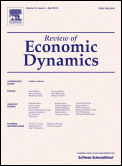
REVIEW OF ECONOMIC DYNAMICS
Exploring the Complexities of Economic BehaviorREVIEW OF ECONOMIC DYNAMICS, published by Academic Press Inc, Elsevier Science, is a leading academic journal in the field of economics and econometrics, holding a distinguished Q1 ranking in its category as of 2023. With an impactful focus on the theoretical and empirical analysis of dynamic economic systems, the journal seeks to advance our understanding of economic dynamics through innovative research that addresses contemporary issues and policy implications. The journal boasts a significant history of contributions from renowned scholars since its inception in 1998, and will continue to publish through 2025. Although it does not currently offer open access options, the journal serves as a crucial resource for researchers, professionals, and students who are keen to explore and engage with the latest findings in economic theory and practice. With a current Scopus rank of #280 out of 716 in the Economics and Econometrics category, the REVIEW OF ECONOMIC DYNAMICS remains an invaluable platform for scholarly discussion and insight into the complexities of economic behavior.
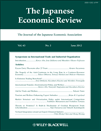
JAPANESE ECONOMIC REVIEW
Exploring the intersections of policy and economic theory.Japanese Economic Review, published by Springer Heidelberg, is a renowned academic journal that aims to advance the understanding of economic processes within the context of Japan and the Asia-Pacific region. With an ISSN of 1352-4739 and E-ISSN of 1468-5876, this journal features high-quality research articles that span a broad range of topics in economics and econometrics. Ranked in the Q2 category for Economics and Econometrics as of 2023, it holds a Scopus rank of #332 out of 716, placing it in the 53rd percentile among its peers. Although not Open Access, the journal invites contributions that provide insights and empirical analyses beneficial to both academics and practitioners. Emphasizing a deep understanding of economic dynamics, the Japanese Economic Review is essential reading for anyone interested in the implications of economic policies and trends, making it a significant platform for scholarly dialogue and research dissemination.
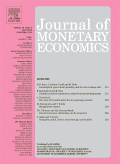
JOURNAL OF MONETARY ECONOMICS
Unraveling Complexities in Monetary EconomicsJOURNAL OF MONETARY ECONOMICS, published by Elsevier, stands as a premier platform for scholars and practitioners in the field of monetary economics. With a robust ISSN of 0304-3932 and E-ISSN 1873-1295, this esteemed journal has maintained a significant influence since its inception in 1975, continuing its legacy of rigorous scholarship through to 2024. The journal is recognized for its high impact in the field, boasting a Q1 category in both Economics and Econometrics and Finance as per the 2023 rankings. Its Scopus rankings underscore its prominence, with a top percentile standing in critical categories—a testament to its critical role in advancing research and discourse. While not an open-access publication, it offers invaluable insights for those dedicated to understanding complex fiscal dynamics and economic policies. The Journal of Monetary Economics serves as an essential resource for researchers, professionals, and students eager to explore the intricacies of financial systems and economic theory.

JOURNAL OF MONEY CREDIT AND BANKING
Illuminating the Interplay of Money and MarketsJOURNAL OF MONEY CREDIT AND BANKING, published by Wiley, stands as a premier academic outlet in the domains of finance, economics, and accounting. With an ISSN of 0022-2879 and an E-ISSN of 1538-4616, this journal serves as a vital resource for researchers seeking to explore the dynamic interactions between money, credit, and banking systems. Compiling groundbreaking research since its inception, the journal boasts an impressive Q1 quartile ranking across key categories in the 2023 metrics, reflecting its prestige in the fields of Accounting, Economics, and Finance. It ranks among the top in its class with a Scopus ranking that underscores its contribution and influence in scholarly discourse, especially in the evolving contexts of economic policy and financial markets. Although not available as an open-access publication, the journal’s commitment to high-quality peer-reviewed research makes it indispensable for professionals, students, and academicians aiming to stay abreast of developments in monetary theory and practice. With the aim of fostering scholarly exchanges, the JOURNAL OF MONEY CREDIT AND BANKING remains a cornerstone for advancing understanding and application of critical financial concepts.
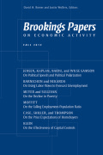
BROOKINGS PAPERS ON ECONOMIC ACTIVITY
Illuminating Trends in Economic Theory and Practice.BROOKINGS PAPERS ON ECONOMIC ACTIVITY, published by Johns Hopkins University Press, stands at the forefront of economic research, providing critical insights and analysis across the fields of economics and econometrics. With a prestigious Q1 ranking in both the Business, Management and Accounting (miscellaneous) and Economics and Econometrics categories for 2023, this journal is renowned for its scholarly contributions that shape public policy and debates within the economic community. Since its inception, the journal has consistently published high-impact research and innovative discussions surrounding economic activity, making it an essential resource for researchers, professionals, and students alike. Although it does not offer open access, its academic rigor and relevance continue to attract a broad readership, contributing to a deeper understanding of economic phenomena in the United States and beyond. For more information, visit the journal’s homepage or the Johns Hopkins University Press website.

International Journal of Economic Policy Studies
Shaping Future Policies Through Rigorous Scholarship.The International Journal of Economic Policy Studies is a premier academic journal published by SPRINGERNATURE, dedicated to advancing research in the fields of economics, political science, and sociology. With an ISSN of 2524-4892 and an E-ISSN of 1881-4387, this journal is recognized for its commitment to open access, fostering global dissemination of knowledge while promoting rigorous peer-reviewed scholarship. Based in Japan and operating from CAMPUS, 4 CRINAN ST, LONDON N1 9XW, ENGLAND, it has successfully established itself as a valuable resource for researchers and professionals alike. The journal's impact is reflected in its respectable Q3 status across major categories, including Economics and Econometrics and Political Science, complemented by its Scopus rankings that showcase its significance in the academic community. Spanning the years from 2019 to 2024, the International Journal of Economic Policy Studies serves as an essential platform for critical discussions and innovative policy analysis, making it a must-read for scholars looking to explore contemporary issues and foster informed decision-making.

Journal of Central Banking Theory and Practice
Exploring Innovative Insights in Monetary PolicyThe Journal of Central Banking Theory and Practice, published by SCIENDO, is a leading open-access journal that has been providing valuable insights into the realms of central banking, monetary policy, and financial stability since its inception in 2012. With its ISSN 1800-9581 and E-ISSN 2336-9205, this journal emphasizes rigorous scholarly research, catering to a wide audience of economists, finance professionals, and academic researchers. Based in Germany, the journal has established a strong reputation, evident from its improved category quartiles - moving from Q3 in Economics, Econometrics, and Finance to a commendable Q2 in 2023. With an impressive Scopus rank of #83/288 in General Economics and a 71st percentile ranking, it stands as a pivotal resource for understanding current trends and practices in central banking. Authors are encouraged to submit high-quality, original research that fosters knowledge and advances the field. This journal not only disseminates significant findings but also promotes discussions that are critical for policymakers and stakeholders in the financial sector.
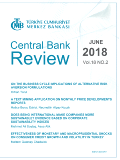
Central Bank Review
Exploring the forefront of central banking research.Central Bank Review is a leading journal published by the CENTRAL BANK REPUBLIC TURKEY, dedicated to advancing the field of economics and finance. With an ISSN of 1303-0701 and an E-ISSN of 1305-8800, this open-access journal has been serving the academic community since 2016, providing a rich source of knowledge for researchers, professionals, and students alike. The journal focuses on a diverse range of topics within economics, econometrics, and finance, making it a valuable resource for those looking to stay at the forefront of these rapidly evolving fields. Notably, in 2023, it achieved a Q2 ranking in both Economics and Econometrics and Finance, highlighting its relevance and impact within the academic community, with Scopus rankings placing it in the top quartile of its categories. Central Bank Review not only contributes to rigorous academic discourse but also offers insights and policy discussions pertinent for central banking and economic policy, solidifying its importance in shaping the future of economic research. Located in the Netherlands, this journal provides easy access to its published articles, ensuring that vital research reaches readers globally.

Eurasian Economic Review
Shaping the future of economics through open access.Eurasian Economic Review is a premier academic journal dedicated to the dissemination of high-quality research in the field of economics, notably within the Eurasian context. Published by SPRINGER HEIDELBERG in Switzerland, this journal stands out with an impressive Q2 ranking in the 2023 category of Economics, Econometrics and Finance, reflecting its influential role in fostering scholarly dialogue. The journal encompasses a broad array of topics related to economic trends, policy impacts, and theoretical advancements, making it an essential resource for researchers, professionals, and students alike. With a consistent output since its inception in 2011, the Eurasian Economic Review is committed to providing open access to its valuable content, ensuring that important findings are widely available to the global research community. As a member of the top 9th percentile in Scopus rankings for its field, this journal uniquely positions itself as a vital conduit for innovative and impactful research in economics.